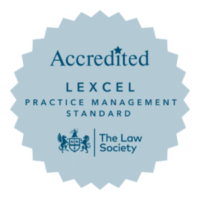It’s Dying Matters Awareness Week
10th May 2021
Why does Dying Matters Awareness week matter?
You might hear in the news or on social media this week that it is Dying Matters Awareness week. If you’re young or generally in good health you might be wondering why this is something that is relevant to you. Well, we hope to explain more here. The theme of Dying Matters Awareness week this year is focused on being in a good place to die, which can mean different things to different people. We want to explore the idea of having your ‘affairs’ in order before you die.
End of life from the point of view of a solicitor
As a Solicitor handling all manner of aspects relating to end of life and also estate administration, it is easy for me to see how important it is to ensure your will is up to date, that you have a Lasting Power of Attorney should you not be able to make decisions for yourself and that your Executors know where you squirrel away all your important paperwork in anticipation of needing to locate it to handle your estate when you die.
The last fourteen months has certainly made us all realise that life is not eternal. We have been constantly reminded about people dying and the number of deaths in 2020 was 77,161 higher than the number registered in 2019. This is the biggest year on year increase since 1940[1].
Talking about death and dying
A conversation about death is not a natural one, nor an easy one, to have with your nearest and dearest, but it is an incredibly important conversation to have. Communicating your wishes for your funeral, how you want to pass on personal possessions, how you’d like your assets, such as property or money to be divided up, making sure anyone you care for is looked after should you die before them (including your pets) are all very important considerations. If your family or close friends do not know what your wishes are, then it makes the situation much harder for them to cope with when the time comes.
What can you do to make a sad time a little less daunting?
- Make a Will – your Will appoints Executors (those who will be in charge of arranging your funeral and dealing with your property, bank accounts and personal possessions). It will also confirm how you wish your assets to be distributed to the named beneficiaries. A Will provides certainty and can save any upset by making your wishes clear.
- Write a letter of wishes – if you are not sure how exactly to plan your funeral, you can write a letter to your Executors to outline your wishes for your funeral or the letter could outline how you wish your personal possessions, such as collections you may have, to be divided. The items do not need to be of particularly monetary value but something that is important to you. For example, do you have a collection of handbags, or postcards, or memorabilia to pass on?
- Have a Lasting Power of Attorney – whilst this document ceases to have effect when you die, it is a valuable document to have should you not be able to manage your affairs yourself. There are two types of power of attorney: one for property and finances; the other for health and welfare decisions. You can appoint people whom you trust to make important decisions on your behalf should you no longer be able to make these yourself. Having a power of attorney can ensure that monies can be accessed to pay for your daily living or attorneys can be involved in any medical treatment decisions. It provides peace of mind for those looking after you or those who could ultimately be looking after you.
Dying Matters Awareness does matter
Whilst the above situations are not ones that any of us wish to consider, it is important that we do talk about our wishes with our families and those close to us.
If you require any assistance with the preparation of a Will or Lasting Power of Attorney, then please do not hesitate to contact us on 01761 414646 to speak to Laura Ablett or another member of our Wills and Probate Team.
[1] Office of the National Statistics
Related news
Articles you may find useful
Like this article? Sign up for our regular newsletters





